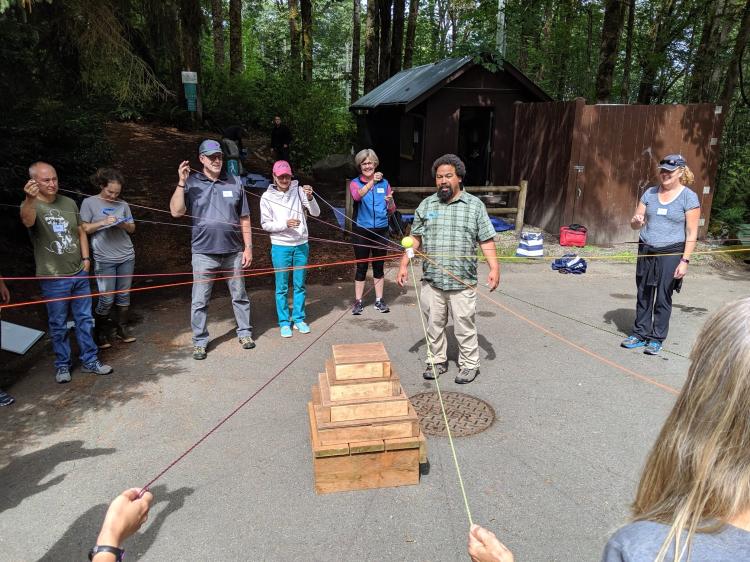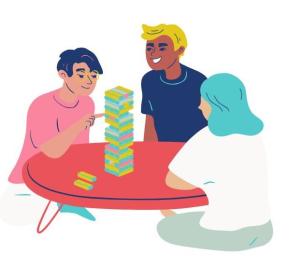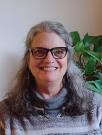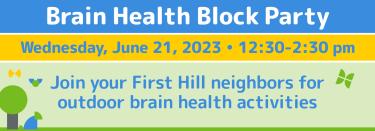
A photo of S.O.A.R., which stands for Shared Outdoor Adventures for Resilience, an outdoor opportunity offered by the UW MBWC in 2019.
June is Alzheimer's and Brain Awareness Month! Each week, the Memory and Brain Wellness Center team will share information on brain health! These important, evidence-based tips involve nutrition, sleep, nature exposure, stress reduction, physical activity, and social engagement, and cognitive stimulation. This week, we are sharing evidence-based information about promoting brain health through staying socially connected to your community.
Quick tip:
Social Engagement Promotes Brain Health

by Sketchify
Moments of connection and togetherness have a big impact on our brain health and wellbeing. Research shows that people who are more socially connected live longer and have better physical, mental, and cognitive health outcomes. Social isolation, on the other hand, can lead to poorer health outcomes. The good news is that these are prevented.
- What's the evidence? Social isolation is one of the 12 “modifiable risk factors” for dementia included in the Lancet Commission report published in 2020. The UW ADRC Associate Director Eric Larson, MD, served as one of the 28 authors on the report. Read more: Q & A: New Lancet report offers hope for preventing dementia [Kaiser Permanente].
- A 2023 advisory report (Our Epidemic of Loneliness and Isolation) from the US Surgeon General compared social isolation to smoking cigarettes. It turns out that chronic isolation can increase the risk of premature death as much as smoking up to 15 cigarettes a day does. Chronic isolation and loneliness can also increase the risk of dementia in older adults by 50%, reports Katie Freeman in a new article on social connection on the MBWC website.
- News you can use. On April 18, 2023, Age Friendly Seattle Civic Coffee, in collaboration with the Senior Center of West Seattle, hosted a panel discussion about brain health, memory loss, and how efforts from local organizations are promoting brain health, including by offering community programs to foster social engagement and lessen social isolation for older adults. The panelists were Seattle City Councilmember Lisa Herbold (District 1—West Seattle, South Park, Georgetown, Industrial District, SODO, and Pioneer Square); Karen Thompson, Alzheimer’s Association Washington State; Sandy Sabersky, Elderwise, who is one of our collaborators at the Memory Hub! Watch the recording or read the recap [AgeWise].
Opportunities and Tips to Stay Socially Engaged

by Trendify
Social engagement can take many forms. Sharing a meal , learning with others in a class, and looking at photos with old friends are just a few examples. Social activities often involve other activities that promote health and wellbeing: walking or dancing, cooking and eating whole foods, learning a new game, laughing and other forms of stress relief!
Explore these opportunities and resources for finding ways to connect.
- The COVID-19 pandemic challenged us to find new and inventive ways to connect with one another. In 2020, Carolyn Parsey, a neuropsychologist at the UW Memory and Brain Wellness Center, gave a community wellness presentation titled, Staying Connected During Social Distancing. Some suggestions that she shared include: reading a story together, play a game, play music or singing, holding a family “talent show,” teaching a talent, writing letters to family or friends, sharing gratitude, or hosting a poem or book club. You can view the slides and resources from this presentation.
- Share the word about events specific to the needs of African American elders and focus on brain health and memory care—Memory Sunday (June), Grandparents Day (September), and the African American Caregivers Forum (November). Learn about the summer pilot of the SHARP program, culturally engaging walking and brain health program that aims to improve cognitive health among older Black adults.
- Visit the Memory Hub! Our dementia-friendly community center, the Memory Hub, promotes social and community engagement for those living with memory loss or dementia and their care partners. The programs include the Alzheimer's Café, Virtual Coffee Chat, Garden Discovery Program, Elderwise Day Program. Anyone with an interest in supporting people with dementia in their communities can check out Dementia Friends Washington and learn about becoming a Dementia Friend!
- Grab an art buddy and work on a creative activity together. For some inspiration, check out the Frye Art Museum's Frye Family video playlist of guided art-making activities to do at home, such as making flowers out of egg cartons or vegetable stamps, bubble prints, or paper sculptures. Another great resource is the video recordings of garden walks and nature-inspired home projects from the MBWC Garden Discovery program.






31__ex-sm.jpg)


